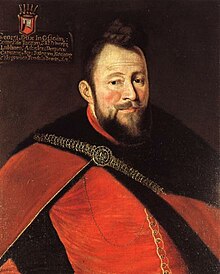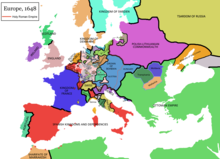Jerzy Ossoliński

Jerzy Ossoliński (born December 15, 1595 in Sandomierz , † August 9, 1650 in Warsaw , also Germanized "Georg Ossolinski") was a Szlachta (nobleman) and statesman from Poland-Lithuania . As one of the outstanding diplomats of his time, he achieved international renown.
Youth and activity under Sigismund III. (1595-1632)
Jerzy Ossoliński's training began at the Jesuit College in Pułtusk , where he impressed his teachers with his skills. He then traveled to various European universities for eight years, studied at the University of Graz, founded in 1585, as well as in England, France and Italy. In the Polish-Russian War he took part in several campaigns from 1617 until the armistice in 1618. For King Sigismund III. Wasa , he carried out a number of diplomatic missions very successfully in the period that followed. In 1621 he traveled to England as an envoy to win King James I as a mediator between Poland-Lithuania and Sweden. In 1629 he took part in the Altmark Conferences, at which the Treaty of Altmark was concluded, which included a six-year armistice between Sweden and Poland-Lithuania. In 1630 he became Grand Treasurer (Minister of Finance) of the Polish Crown. 1632, when Sigismund III died. Ossoliński campaigned for the establishment of Władysław IV Wasas as the new King of Poland and Grand Duke of Lithuania. Under this Ossoliński played a key role in shaping Polish foreign policy.
Foreign policy under Władysław IV. (1633–1647)
In 1633 he traveled to Rome, where he was appointed Prince of Ossolin by Pope Urban VIII . In 1634 he came to Vienna on a diplomatic mission and was appointed Prince of the Holy Roman Empire by Ferdinand II . In 1635 he traveled to Prussia as Polish war governor , where he signed the Treaty of Stuhmsdorf between Poland and Sweden, in which Sweden undertook to give up its conquests in Royal Prussia in favor of Poland-Lithuania. In the same year he founded the Knightly Order of the Immaculate Conception, whose statutes he had brought with him from his visit to the Pope. This short-lived, strictly Catholic order was resolutely rejected by the predominantly Protestant nobles of Prussia and Lithuania.
In 1636 he visited the German Reichstag in Regensburg , where he voted for Ferdinand III. to the German-Roman emperor. On the fringes of the Reichstag, he concluded the marriage contract between Władysław IV and Archduchess Cäcilia Renata of Austria . In 1638 the Order of the Immaculate Conception was dissolved by the Sejm and Ossoliński was prohibited from wearing the non-Polish title of “Prince”.
After his return he was awarded the rank of Voivode of Cracow , in 1639 he was appointed Vice Chancellor of the Polish-Lithuanian Empire and in 1643 he was finally elevated to the position of Grand Chancellor of the Crown.
In 1641 Ossoliński traveled again to Rome to discuss the plans of the Polish king for his foreign policy with the Pope. In 1642 he succeeded in negotiating the approval of a "reward" by the Sejm to the king, which was able to settle his debts accumulated in the course of the Russo-Polish War 1632–1634 . In 1645 he led the Thorner Religious Discussion (Colloquium Charitativum) on royal commission in Thorn , in which unsuccessful attempts were made to reduce the differences between Catholics and Protestants. In the same year he was appointed Crown General. In 1646 he traveled to possibly negotiate with the Cossacks in the Ukraine . In 1647 he was involved in founding the first Polish post office.
Work under Johann II and death (1648–1650)
After the death of Władysław IV in 1648, Ossoliński pushed through the election of his half-brother, John II Kasimir, as King of Poland. In 1649 he contributed significantly to the peace treaty of Zborów with the rebellious Cossacks under Bohdan Khmelnyzkyj .
He died in August 1650 at the age of 54. His state speeches (orationes) were published by Georg Forster in Danzig in 1640.
swell
- R. Nisbet Bain: Slavonic Europe - a Political History of Poland from 1447 to 1796 . Cambridge Univ. Press, 2013, ISBN 978-1-107-63691-0 (English).
- Ossolinski . In: Meyers Konversations-Lexikon . 4th edition. Volume 12, Verlag des Bibliographisches Institut, Leipzig / Vienna 1885–1892, p. 475.
- Ossolinski . In: Heinrich August Pierer , Julius Löbe (Hrsg.): Universal Lexicon of the Present and the Past . 4th edition. tape 12 . Altenburg 1861, p. 404-405 ( zeno.org ).
| personal data | |
|---|---|
| SURNAME | Ossoliński, Jerzy |
| ALTERNATIVE NAMES | Ossolinski, Georg |
| BRIEF DESCRIPTION | Polish statesman of international importance |
| DATE OF BIRTH | December 15, 1595 |
| PLACE OF BIRTH | Sandomierz |
| DATE OF DEATH | August 9, 1650 |
| Place of death | Warsaw |
